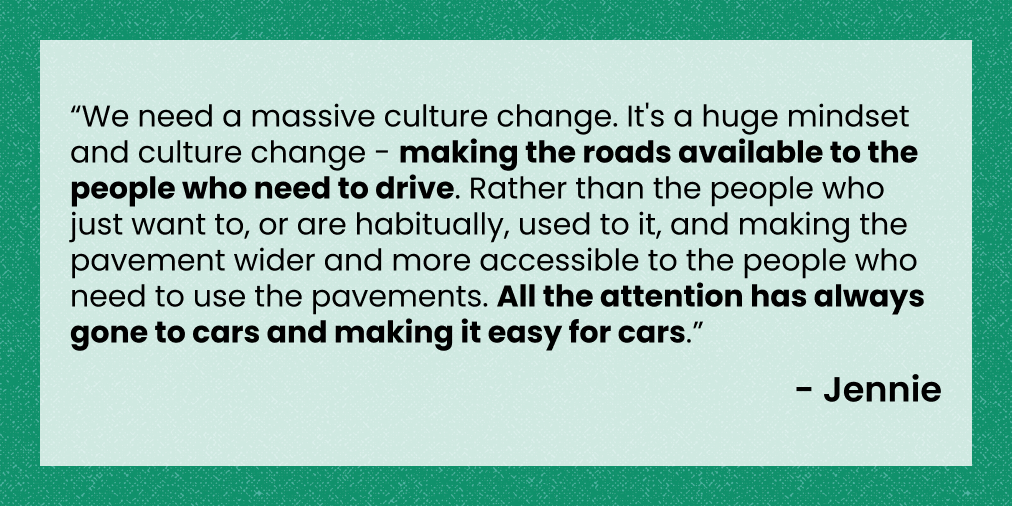Our new report on making cities accessible to everyone
In collaboration with University of Westminster’s Active Travel Academy, we have published a report detailing:
The problems experienced by disabled people in our cities.
The impacts of the low-car transition on disabled people.
Pathways to achieving an inclusive low-car city.
With transport accounting for 27% of the UK’s greenhouse gas emissions, a transition away from mass private car ownership in cities is needed to tackle the climate crisis. Creating these low-car futures must be a process which actively involves disabled people in order to best overcome the daily challenges and barriers they face.
Disabled people are really concerned about the climate crisis and they know that massive changes are needed to meet our climate goals. Our new report looks to the future of car-free cities with accessibility for all.
(Alt-text) Quote by a participant, Alice, saying that disabled people care about the climate emergency and that they want adaptations to happen, but reasonable adjustments must be made for disabled people to participate in society.
Participants from our focus groups reveal that they were excluded from planning decisions during the pandemic, resulting in low-car infrastructure that did not work for them.
(Alt-text) Quote by a participant, Marion, saying that during the changes to cities during the pandemic (for example, pop-up restaurants and the closing disabled parking bays) happened without proper consultation of disabled people which made it harder for disabled people to move around.
Disabled people must be at the heart of decision making as we redesign cities away from mass private car ownership, and introduce low-car infrastructure.
Currently, our transport system too often ignores the needs of disabled people. Participants in our research speak of their everyday struggles: cracked pavements, the lack of dropped kerbs, inappropriate level access on public transport as well as the inadequate space for wheelchairs.
Unfortunately, this has locked many disabled people into car dependency. As one participant has said:
(Alt-text) Quote by a participant - “It would just be an impossible existence for me if I wasn’t allowed to have a car” - Jamie
Our report concludes that efforts to reduce traffic need to focus on encouraging non-disabled people to make fewer car journeys. As one participant suggested:
(Alt-text) Quote by a participant, Sarah, saying - By getting more people who are able to use public transport using public transport, cities would be more open for disabled people to access it by whatever means.
We also need substantial improvements to walking, wheeling and cycling environments as well as a public transport system accessible to all - giving everyone more car-free options.
We are calling on the UK government and local councils to actively involve disabled people when redesigning our cities to reduce car use and tackle climate change.
(Alt-text) Quote by participant, Lora, saying - disabled people cannot be an afterthought. It's got to work and what works for disabled people will work for everyone.
(Alt-text) Quote by participant, Mary, saying - pavements are now full of many more objects than they used to be.
(Alt-text) Quote from participant, Lora, saying - getting on to buses is difficult. People don’t want you there. If there is a buggy in disabled person’s space so the busy doesn’t stop.
(Alt-text) Quote from participant, Jackie, saying that peripheral roads were closed which meant they could take their bikes down them, and they enjoyed that a lot.
(Alt-text) Quote from participant, Jim, saying that there were some really positive aspects to street closures and instead of trying to keep them, many places just opened the roads again.
(Alt-text) Quote from participant, Silvia, saying that electric cars might not be the solution. Charging cables are heavy and the ports are awkward to plug into. More thought is needed if electric vehicles are going to be helpful to those disabled people that need to drive.
(Alt-text) Quote from participant, Jennie, saying that we need to focus on making roads available for those who need to drive and that in the past all focus has gone on cars and making it easier for cars.
(Alt-text) Quote from participant, Jennie, saying that historically vehicles have been at the top of the priority road pyramid, we need to flip it and build streets for people and not vehicles.

![Quote: "Disabled people do care about the environment and the climate change emergency. We do care about this stuff. It's not that we don't want to make these adaptations [...]. We need reasonable adjustments [...] - Alice'](https://images.squarespace-cdn.com/content/v1/5d30896202a18c0001b49180/d1d99332-7adf-4ce7-ad8d-0a938771560a/twitter-4-1.jpeg)
![Quote 'Over the pandemic [...] all sorts of things cropped up without proper consultation. And some of those things are just making it much harder for disabled people to move around.' - Marion](https://images.squarespace-cdn.com/content/v1/5d30896202a18c0001b49180/5df8913b-efc2-4f1b-bfd8-c4b994e10f49/twitter-2-1.jpeg)









